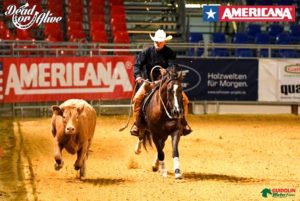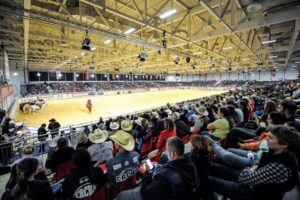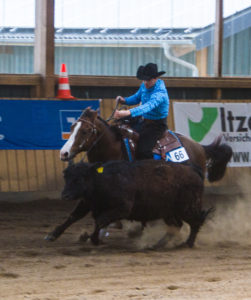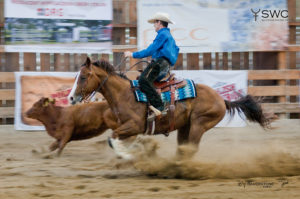
Hannes Winkler going
down the fence at the
Americana.
Feeling a horse hook up to a cow and work it by instinct is a feeling few can ever forget. The sport of reined cow horse is capturing rider’s hearts around the world. Not everyone has the cattle but they have the desire to find creative substitutes like working dairy cows and even dogs.
There is a growing group of enthusiastic cow horse riders in Europe. A majority of the shows take place in Italy but the sport is gaining interest across many countries in the region. The European affiliate of the NRCHA is called the European Reined Cow Horse Association.
Shows are held in Germany, and Poland as well. One of their largest competitions, The Americana, is set to start in September 8-12 at Augsburg, Germany which hosts each of the Western disciplines that have become popular in Europe (reining, reined cow horse and cutting).
Hannes Winkler – Austria
Hannes Winkler, from Ellmau, Austria, was introduced to cow horses after attending a clinic with Al Dunning in 2010 in Arizona. He saw cow horses work and decided that was the sport for him.
He purchased two yearlings in the United States and in 2016 brought one back to Austria when it was three-years-old. It allowed him to continue to learn, practice and show in Europe while he still traveled to the United States to learn.
Winkler said there is a good selection of shows in Northern Italy and Southern Germany which are each a four hour drive from him.
He has placed 1st in the two-rein class and 5th in the bridle class at the European Championships in 2019.
Winkler travels to Scottsdale, Arizona multiple times a year to ride with Al Dunning. He usually has at least one horse in training in Arizona for the Snaffle Bit Futurity and looks forward to watching his prospect for the 2021 Futurity in October.
“Besides last year, I have been to every Snaffle Bit Futurity since 2012.”
He has his own ranch in Austria where he keeps 15-20 cows to work his five horses. He tried to lease cattle but it didn’t work out so he buys them, keeps them for a month and then sells them.
He said for the big shows like the Americana, which offers classes for all of the western disciplines in Europe, they truck in 1,500 cattle from all over Europe.

Augsburg Trade Fair Center Augsburg, Germany where the Americana is held.
“It’s getting the cows. Over here you don’t have herds. The average farmer in Austria has eight or nine cows and it’s usually milk cows. You don’t have the beef meat production like over there in the States,” Winkler said.
Winkler estimates that, “our prices for cattle are about 30 to 50% higher than yours in the States. That’s not a big problem, since people are prepared to pay for good cattle. The challenge is more to get enough good cattle for he big shows.”
“The cows I’m getting are between six to eight months old…I know ours are faster than in the States. I think the main reason is most cattle in the States have seen horses before. The cattle we get have never seen horses so they [spook] a bit when they first see horses.”
Winkler has a friend that keeps bison but he is hesitant about the idea of working a bison so he keeps cows.
“I’ve been to one show with Zebus and everyone says they last forever. My experience was that they don’t last forever. I’m not a big fan of either but you can get both here.”
Winkler even tried to train his dog to be worked but so far, he said, it hasn’t been successful. Winkler is excited to hear that the NRCHA announcer, Darren Moore will be there announcing at the Americana this year.

Trispel circling a cow at Galloway Star Ranch in Giekau, Germany in 2016
Henning Trispel – Germany
Henning Trispel from Schleswig-Holstein, the most northern part of Germany, started riding at a barn that had cow horses. It was there he met trainer Alex Tuzakov, who has worked in the United States with Morgen Lybbert, Bobby Harrison, Bozo Rogers, Bobby Hunt, Todd Crawford, Jamie Snyder and Faron Hightower. Tuzakov is now Trispel’s trainer.
“Cow horse is simply the best! You get everything. You get reining, cutting and down the fence with the cow. That’s just the [most] fun,” Trispel said.
Trispel has backed off showing since he has three young children but he and his wife Janna are planning on hitting the show pen again once the kids are older. Previously, he showed two to three times a year. He hopes to one day take a vacation to the United States and ride with a trainer.
Trispel said one of his horses was shipped over to Germany as a four year old by a fellow cow horse competitor. The horse was trained and shown in Texas. The previous owner was forced to sell him and Trispel was fortunate to purchase him. His trainer Tuzukov won the 2011 European Reserve Champion title in the cow horse Open.
Triple estimates that there are less than 10 cow horse competitors in the northern part of Germany and about 12 cow horse shows in the country. He believes that there are about 500 cow horse members and competitors across Europe. He said watching a cow horse going down the fence is always the main attraction at shows even when there are multiple disciplines at the shows. It is usually held at night when the most spectators are available to watch.
Trispel uses the flag at home and has to travel to work cows once a month which are usually dairy cows. Getting access to cows in Germany, he said, is the sport’s biggest challenge.
Trispel and his wife love to tune into the cow horse competitions in the United States. He said the main differences are the quality of the horses and riders.
There are only a handful of cow horse trainers in Germany that do it full time. Most competitors have to have an outside job to finance their cow horse passion.

Trispel going down the fence Karpacz, Poland
Trispel said European quarter horse breeders are really improving and there is even Shiney Outlaw semen available.
He has participated in clinics taught by US trainers Sandy Collier, Todd Bergen and Faron Hightower who travelled to Europe.
The western industry in Europe appears to be going from strength to strength. ”[It has grown about] 25% over the last 4 years, considering the entry numbers at the shows,” he said.
